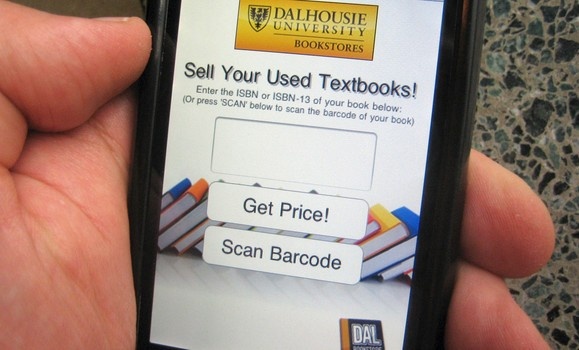Have you ever wanted to know how much you can earn for your old textbook without bringing it in to the Bookstore? Well, now thereтАЩs an app for that.
The free mobile appтАФnow available through and the app storeтАФallows students to scan the barcode of their used book with their smart phone to instantly find out the amount the Bookstore will pay for their used textbook. The app also works by typing in the ISBN number found above the bookтАЩs bar code.
Tina Shannon, the BookstoreтАЩs manager, says ║┌┴╧│╘╣╧═Їis the first university in Atlantic Canada to adopt the new app, which was developed by the company Bookstore 2.0 based out of Kingston, Ont.
тАЬThe app is new this year and we jumped on it as soon as it was available,тАЭ says Ms. Shannon, adding that the app offers her customers an added level of convenience. тАЬNow, instead of having to bring their old textbooks into the Bookstore when book buybacks are scheduled, they can do it from the comfort of their home. It really is very straightforward and easy-to-use.тАЭ
Buyback - December 9-21
The app comes just days before one the BookstoreтАЩs biggest book buyback events of the year. Running from December 9-21, the buyback event is expected to attract hundreds of students who want to turn in their old textbooks from courses that ended after the fall semester. Ms. Shannon explains that four major book buyback events are held every yearтАФat the start and end of each semesterтАФalong with a smaller one held every Friday.
She estimates that about $230,000 is paid out to students each year through the book buyback program. And while the Bookstore would like to buy back as many books as possible, Ms. Shannon notes that not all textbooks are eligible for purchase.
тАЬBasically, we wonтАЩt accept books that have pages torn out or covers missing, or have signs of any water damage,тАЭ Ms. Shannon says. But they donтАЩt have to be in pristine condition, either. тАЬA little bit of highlighting and writing is expected, so weтАЩll accept those just so long as itтАЩs not too much.тАЭ
The amount the used books are worth depends, in large part, if its associated course will be offered again the following semester тАУ if it is, those books can fetch as much as 50 per cent of the original price. The Bookstore also buys books on behalf of an international wholesaler, so even if your textbook canтАЩt be re-sold through the Dal Bookstore, it may still offer money for it if thereтАЩs a market for it somewhere else.
In addition to giving students the chance to earn some extra cash, Ms. Shannon points out that the book buyback program has a bigger benefit for the university in its ongoing efforts to becoming a leader in sustainability.
тАЬItтАЩs a great recycling program,тАЭ says Ms. Shannon. тАЬItтАЩs just one more way we can help protect the environment.тАЭ
Download:
Download:

